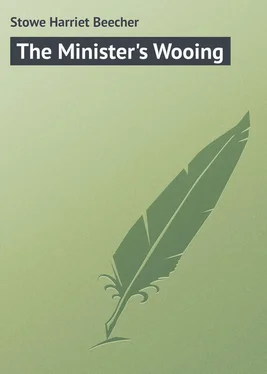Harriet Stowe - The Minister's Wooing
Здесь есть возможность читать онлайн «Harriet Stowe - The Minister's Wooing» — ознакомительный отрывок электронной книги совершенно бесплатно, а после прочтения отрывка купить полную версию. В некоторых случаях можно слушать аудио, скачать через торрент в формате fb2 и присутствует краткое содержание. ISBN: , Издательство: Иностранный паблик, Жанр: foreign_prose, на английском языке. Описание произведения, (предисловие) а так же отзывы посетителей доступны на портале библиотеки ЛибКат.
- Название:The Minister's Wooing
- Автор:
- Издательство:Иностранный паблик
- Жанр:
- Год:неизвестен
- ISBN:http://www.gutenberg.org/ebooks/47958
- Рейтинг книги:4 / 5. Голосов: 1
-
Избранное:Добавить в избранное
- Отзывы:
-
Ваша оценка:
- 80
- 1
- 2
- 3
- 4
- 5
The Minister's Wooing: краткое содержание, описание и аннотация
Предлагаем к чтению аннотацию, описание, краткое содержание или предисловие (зависит от того, что написал сам автор книги «The Minister's Wooing»). Если вы не нашли необходимую информацию о книге — напишите в комментариях, мы постараемся отыскать её.
The Minister's Wooing — читать онлайн ознакомительный отрывок
Ниже представлен текст книги, разбитый по страницам. Система сохранения места последней прочитанной страницы, позволяет с удобством читать онлайн бесплатно книгу «The Minister's Wooing», без необходимости каждый раз заново искать на чём Вы остановились. Поставьте закладку, и сможете в любой момент перейти на страницу, на которой закончили чтение.
Интервал:
Закладка:
It is not in our line to imply the truth or the falsehood of those systems of philosophic theology which seem for many years to have been the principal outlet for the proclivities of the New England mind, but as psychological developments they have an intense interest. He who does not see a grand side to these strivings of the soul cannot understand one of the noblest capabilities of humanity.
No real artist or philosopher ever lived who has not at some hours risen to the height of utter self-abnegation for the glory of the invisible. There have been painters who would have been crucified to demonstrate the action of a muscle, – chemists who would gladly have melted themselves and all humanity in their crucible, if so a new discovery might arise out of its fumes. Even persons of mere artistic sensibility are at times raised by music, painting, or poetry to a momentary trance of self-oblivion, in which they would offer their whole being before the shrine of an invisible loveliness. These hard old New England divines were the poets of metaphysical philosophy, who built systems in an artistic fervour, and felt self exhale from beneath them as they rose into the higher regions of thought. But where theorists and philosophers tread with sublime assurance, woman often follows with bleeding footsteps; – women are always turning from the abstract to the individual, and feeling where the philosopher only thinks.
It was easy enough for Mary to believe in self -renunciation, for she was one with a born vocation for martyrdom; and so, when the idea was put to her of suffering eternal pains for the glory of God and the good of being in general, she responded to it with a sort of sublime thrill, such as it is given to some natures to feel in view of uttermost sacrifice. But when she looked around on the warm, living faces of friends, acquaintances, and neighbours, viewing them as possible candidates for dooms so fearfully different, she sometimes felt the walls of her faith closing round her as an iron shroud, – she wondered that the sun could shine so brightly, that flowers could flaunt such dazzling colours, that sweet airs could breathe, and little children play, and youth love and hope, and a thousand intoxicating influences combine to cheat the victims from the thought that their next step might be into an abyss of horrors without end. The blood of youth and hope was saddened by this great sorrow, which lay ever on her heart, – and her life, unknown to herself, was a sweet tune in the minor key; it was only in prayer, or deeds of love and charity, or in rapt contemplation of that beautiful millennial day which her spiritual guide most delighted to speak of, that the tone of her feelings ever rose to the height of joy.
Among Mary’s young associates was one who had been as a brother to her childhood. He was her mother’s cousin’s son, – and so, by a sort of family immunity, had always a free access to her mother’s house. He took to the sea, as the most bold and resolute young men will, and brought home from foreign parts those new modes of speech, those other eyes for received opinions and established things, which so often shock established prejudices, – so that he was held as little better than an infidel and a castaway by the stricter religious circles in his native place. Mary’s mother, now that Mary was grown up to woman’s estate, looked with a severe eye on her cousin. She warned her daughter against too free an association with him, – and so – We all know what comes to pass when girls are constantly warned not to think of a man. The most conscientious and obedient little person in the world, Mary resolved to be very careful. She never would think of James, except, of course, in her prayers; but as these were constant, it may easily be seen it was not easy to forget him.
All that was so often told her of his carelessness, his trifling, his contempt of orthodox opinions, and his startling and bold expressions, only wrote his name deeper in her heart, – for was not his soul in peril? Could she look in his frank, joyous face, and listen to his thoughtless laugh, and then think that a fall from a mast-head, or one night’s storm, might – Ah, with what images her faith filled the blank! Could she believe all this and forget him?
You see, instead of getting our tea ready, as we promised at the beginning of this chapter, we have filled it with descriptions and meditations, – and now we foresee that the next chapter will be equally far from the point. But have patience with us; for we can write only as we are driven, and never know exactly where we are going to land.
CHAPTER III
A quiet, maiden-like place was Mary’s little room. The window looked out under the overarching boughs of a thick apple orchard, now all in a blush with blossoms and pink-tipped buds, and the light came golden-green, strained through flickering leaves, – and an ever-gentle rustle and whirr of branches and blossoms, a chitter of birds, and an indefinite whispering motion, as the long heads of orchard-grass nodded and bowed to each other under the trees, seemed to give the room the quiet hush of some little side chapel in a cathedral, where green and golden glass softens the sunlight, and only the sigh and rustle of kneeling worshippers break the stillness of the aisles. It was small enough for a nun’s apartment, and dainty in its neatness as the waxen cell of a bee. The bed and low window were draped in spotless white, with fringes of Mary’s own knotting. A small table under the looking-glass bore the library of a well-taught young woman of those times. The ‘Spectator,’ ‘Paradise Lost,’ Shakspeare, and ‘Robinson Crusoe,’ stood for the admitted secular literature, and beside them the Bible and the works then published of Mr. Jonathan Edwards. Laid a little to one side, as if of doubtful reputation, was the only novel which the stricter people in those days allowed for the reading of their daughters: that seven-volumed, trailing, tedious, delightful old bore, ‘Sir Charles Grandison,’ – a book whose influence in those times was so universal, that it may be traced in the epistolary style even of the gravest divines. Our little heroine was mortal, with all her divinity, and had an imagination which sometimes wandered to the things of earth; and this glorious hero in lace and embroidery, who blended rank, gallantry, spirit, knowledge of the world, disinterestedness, constancy, and piety, sometimes walked before her, while she sat spinning at her wheel, till she sighed, she hardly knew why, that no such men walked the earth now. Yet it is to be confessed, this occasional raid of the romantic into Mary’s balanced and well-ordered mind was soon energetically put to rout, and the book, as we have said, remained on her table under protest, – protected by being her father’s gift to her mother during their days of courtship. The small looking-glass was curiously wreathed with corals and foreign shells, so disposed as to indicate an artistic eye and skilful hand; and some curious Chinese paintings of birds and flowers gave rather a piquant and foreign air to the otherwise homely neatness of the apartment.
Here in this little retreat, Mary spent those few hours which her exacting conscience would allow her to spare from her busy-fingered household-life; here she read and wrote and thought and prayed; – and here she stands now, arraying herself for the tea company that afternoon. Dress, which in our day is becoming in some cases the whole of woman, was in those times a remarkably simple affair. True, every person of a certain degree of respectability had state and festival robes; and a certain camphor-wood brass-bound trunk, which was always kept solemnly locked in Mrs. Katy Scudder’s apartment, if it could have spoken, might have given off quite a catalogue of brocade satin and laces. The wedding-suit there slumbered in all the unsullied whiteness of its stiff ground broidered with heavy knots of flowers; and there were scarfs of wrought India muslin and embroidered crape, each of which had its history, – for each had been brought into the door with beating heart on some return voyage of one who, alas! should return no more. The old trunk stood with its histories, its imprisoned remembrances, – and a thousand tender thoughts seemed to be shaping out of every rustling fold of silk and embroidery, on the few yearly occasions when all were brought out to be aired, their history related, and then solemnly locked up again. Nevertheless, the possession of these things gave to the women of an establishment a certain innate dignity, like a good conscience, so that in that larger portion of existence commonly denominated among them ‘every day,’ they were content with plain stuff and homespun. Mary’s toilet, therefore, was sooner made than those of Newport belles of the present day; it simply consisted in changing her ordinary ‘short-gown and petticoat’ for another of somewhat nicer materials, a skirt of India chintz and a striped jaconet short-gown. Her hair was of the kind which always lies like satin; but, nevertheless, girls never think their toilet complete unless the smoothest hair has been shaken down and rearranged. A few moments, however, served to braid its shining folds and dispose them in their simple knot on the back of the head; and having given a final stroke to each side with her little dimpled hands, she sat down a moment at the window, thoughtfully watching where the afternoon sun was creeping through the slates of the fence in long lines of gold among the tall, tremulous orchard-grass, and unconsciously she began warbling, in a low, gurgling voice, the words of a familiar hymn, whose grave earnestness accorded well with the general tone of her life and education: —
Читать дальшеИнтервал:
Закладка:
Похожие книги на «The Minister's Wooing»
Представляем Вашему вниманию похожие книги на «The Minister's Wooing» списком для выбора. Мы отобрали схожую по названию и смыслу литературу в надежде предоставить читателям больше вариантов отыскать новые, интересные, ещё непрочитанные произведения.
Обсуждение, отзывы о книге «The Minister's Wooing» и просто собственные мнения читателей. Оставьте ваши комментарии, напишите, что Вы думаете о произведении, его смысле или главных героях. Укажите что конкретно понравилось, а что нет, и почему Вы так считаете.












